SJT question bank

The Situational Judgement Test (SJT) tests your psychological ability to respond rationally and adequately to various scenarios. If you’re studying medicine in the UK, the SJT will be a major deciding factor when you are applying for your Foundation Programme, counting for up to 50% of your grade.
The format of the SJT involves multiple-choice questions where you either rank actions in order of importance based on the situation you are presenting with, or select the most appropriate answers/actions in a given situation.
QUPI helps you prepare for the medical student Situational Judgement Test in two ways.
- By helping you to practice your medical knowledge so you know the medical facts and appropriate actions in the situations that you will be presented with
- By helping you gain confidence when answering multiple-choice questions in a time-pressured environment
To see for yourself how we can help you pass the SJT for your Foundation Programme take QUPI for a free spin today:
Pass SJT with QUPI
Planning on becoming a medical student in the United Kingdom? Sooner or later, you will have to join the Foundation Programme or Academic Foundation Programme – however, to do that, you need to pass the Situational Judgement Test first. While not strictly a medical school exam, all medical graduates in the UK must complete the SJT first in order to work as a doctor. The Foundation Programme acts as a preparation for entry into specialty training, spanning two years and providing graduates with additional medical knowledge and skills, allowing them to meet the formal requirements of the General Medical Council.
What exactly is the SJT?
The Situation Judgement Test (SJT) will check your knowledge and skills appropriate for a Foundation Year 1 doctor. If you’re planning to work as a doctor in the UK, prepare well for the SJT – it is a major deciding factor when applying for the Foundation Programme. In fact, the SJT alone can count for up to 50% of the grade, with the other half being the Educational Performance Measure (EPM). After you have taken your SJT, your points will be summed up and used to rank you among the Foundation Year 1 roles.
The Medical Schools Council provides 9 attributes which will be assessed and rated during the Situational Judgement Test: Commitment to Professionalism, Coping with Pressure, Effective Communication, Learning and Professional Development, Organisation and Planning, Patient Focus, Problem Solving and Decision Making, Self Awareness and Insight, and finally Working Effectively as Part of a Team.
Commitment to Professionalism will measure your honesty and integrity as a doctor, as well as awareness of ethical issues connected with being a doctor. You will have to show reliability and trustworthiness, as well as a commitment to your job. Punctuality, taking responsibility and owning up to your mistakes are a huge part of this category. You will also be presented with inappropriate and unsafe situations, to which you will have to respond properly.
Coping with Pressure deals with your ability to work under heavy stress, showing resilience and perseverance in reaching your goal. You will have to remain in control under pressure, showing a calm and steady attitude. Doctors often face uncertain circumstances that are constantly changing, and you will have to prove your ability to adapt and overcome such obstacles. Moreover, knowledge of effective coping mechanisms for dealing with such situations will be required of you.
Effective Communication, as the name suggests, will assess your ability to engage with patients and colleagues alike. Listening, clarity of communication, and negotiating abilities will be definitely checked, as well as the knowledge of proper medical jargon.
Learning and Professional Development deals with your desire and motivation for further learning, as a doctor learns throughout all of their lives. You will have to show a willingness to learn from your peers, experience, and mistakes, as well as accepting feedback.
Organisation and Planning will task you with creating efficient work plans and properly managing your time. You will have to show the ability to properly prioritize tasks, and re-prioritize them when needed. Maintaining proper records is also a part of this category.
In the Patient Focus category, you will have to prove that your patient is the focus of your care, showing empathy and understanding. Genuine interest, courtesy, compassion, and relationship building are all part of it.
While Problem Solving and Decision Making is a pretty self-explanatory category, Self Awareness and Insight can be a tough one. You will have to show that you are aware of the limitations of your competence, as well as eagerness to seek help when needed. Maintain a proper level of confidence and accept challenges as something unavoidable.
Working Effectively as Part of a Team will test your cooperation skills. You will have to demonstrate an approachable demeanor, respectful of others’ views. Supportiveness and the ability to offer advice to your colleagues also count heavily in this category.
Revision made easy with QUPI
The SJT is a tough and extremely important examination for any aspiring medical student in the UK. The test requires not only knowledge, but also proper attitudes and social abilities that are tough to learn. To prepare better for the unexpected, study with QUPI!
QUPI is an extensive database of medical questions, containing specific questions relevant to some of the most renowned medical examinations worldwide, including the SJT. When studying for the SJT, QUPI will give you the much-needed confidence, as you will know what to expect on the actual exam. Still not convinced enough? Give QUPI a try and begin your 7 Day Free Trial to test all of its functions!


